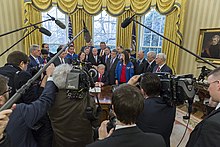Public image of Donald Trump
Donald Trump, having previously served as the 45th president and currently as the 47th, has elicited highly polarized public perceptions about his performance as a head of state and largely controversial opinions about his temperament and personal conduct while in office.
[2][3]Oversized red ties, tanned face, hairstyle, thumbs up and pouted lips are consistent elements of Trump's appearance that are very recognizable and make up an "iconic" imagery.
"[9] As of 2017, Trump's "unique personal style, brashness and disregard for conventional political norms and discourse" gained him attention and detractors, according to Gallup.
He has been parodied regularly on Saturday Night Live by Phil Hartman, Darrell Hammond, and Alec Baldwin, and in South Park as Mr. Garrison.
[17] Trump's wealth and lifestyle had been a fixture of hip hop lyrics since the 1980s; he was named in hundreds of songs, most often in a positive tone.
[25] Fox News anchor Bret Baier and former House speaker Paul Ryan have characterized Trump as a "troll" who makes controversial statements to see people's "heads explode".
[28] In the 2016 campaign, Trump benefited from a record amount of free media coverage, elevating his standing in the Republican primaries.
[29] New York Times writer Amy Chozick wrote in 2018 that Trump's media dominance, which enthralls the public and creates "can't miss" reality television-type coverage, was politically beneficial for him.
[30] According to Columbia Journalism Review, "Because Trump entered the presidential stage from the world of business hucksterism and reality TV, he was seen, from the outset, as a less serious contender.
"[31] Throughout his 2016 presidential campaign and his presidency, Trump has accused the press of bias, calling it the "fake news media" and "the enemy of the people".
[32][33] After winning the election, journalist Lesley Stahl recounted Trump's allegedly saying he intentionally demeaned and discredited the media "so when you write negative stories about me no one will believe you.
[38][41] At the end of Trump's second year, his two-year average Gallup approval rating was the lowest of any president since World War II.
[82][83] Others have had more far-reaching effects, such as Trump's promotion of unproven antimalarial drugs as a treatment for COVID-19 in a press conference and on Twitter in March 2020.
[90] Despite the frequency of Trump's falsehoods, the media rarely referred to them as "lies",[91][92] a word that has in the past been avoided out of respect for the presidential office.
[91][92] Nevertheless, in August 2018 The Washington Post declared for the first time that some of Trump's misstatements (statements concerning hush money paid to Stormy Daniels and Playboy model Karen McDougal) were lies.
By calling facts into question, people will be unable to properly evaluate their government, with beliefs or policy irrationally settled by "political power"; this erodes liberal democracy, wrote Pfiffner.
[113] He has also been accused of racism for insisting a group of black and Latino teenagers were guilty of raping a white woman in the 1989 Central Park jogger case, even after they were exonerated by DNA evidence in 2002.
[114] Trump relaunched his political career in 2011 as a leading proponent of "birther" conspiracy theories alleging that Barack Obama, the first black U.S. president, was not born in the United States.
[115][116] In April 2011, Trump claimed credit for pressuring the White House to publish the "long-form" birth certificate, which he considered fraudulent, and later saying this made him "very popular".
[117][118] In September 2016, amid pressure, he acknowledged that Obama was born in the U.S. and falsely claimed the rumors had been started by Hillary Clinton during her 2008 presidential campaign.
[120] According to an analysis in Political Science Quarterly, Trump made "explicitly racist appeals to whites" during his 2016 presidential campaign.
[124] Trump's comments in reaction to the 2017 Charlottesville far-right rally were interpreted by some as implying a moral equivalence between white supremacist demonstrators and counter-protesters.
[125] In a January 2018 Oval Office meeting to discuss immigration legislation, he reportedly referred to El Salvador, Haiti, Honduras, and African nations as "shithole countries".
[127][128] In July 2019, Trump tweeted that four Democratic members of Congress – all four minority women, three of them native-born Americans – should "go back" to the countries they "came from".
[133][134][135] In October 2016, two days before the second presidential debate, a 2005 "hot mic" recording surfaced in which Trump was heard bragging about kissing and groping women without their consent, saying "when you're a star, they let you do it, you can do anything ... grab 'em by the pussy.
"[136] The incident's widespread media exposure led to Trump's first public apology during the campaign[137] and caused outrage across the political spectrum.
[138] At least twenty-six women have publicly accused Trump of sexual misconduct as of September 2020[update], including his then-wife Ivana.
[146][147] Since then, some defendants prosecuted for hate crimes or violent acts cited Trump's rhetoric in arguing that they were not culpable or should receive a lighter sentence.
[148] In August 2019 it was reported that a man who allegedly assaulted a minor for perceived disrespect toward the national anthem had cited Trump's rhetoric in his own defense.





